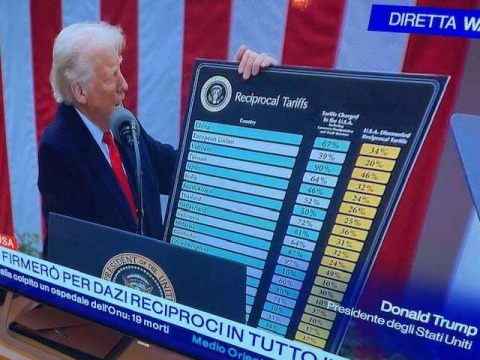
Donald Trump and Liberation Day
Liberation Day
With the initiative announced yesterday evening on global television by the U.S. President Donald Trump, the United States has effectively declared a war—albeit "only" commercial—that threatens to plunge the world into a dark historical period. The media impact of last night’s broadcast, entitled by the elderly tycoon as "Liberation Day," instantly shattered the principle of globalization upon which the global economy has developed, albeit unevenly.
Trump's initiative appears as a return to isolationist policies which, rather than boosting domestic production, risk triggering a dangerous spiral of trade tensions, severely harming international cooperation, and producing effects opposite to those intended, prejudicing both the global economy and the United States itself.
Facing difficulties due to his inability to deliver on his bold statements of immediate pacification in Ukraine and Palestine, where violence continues and peaceful solutions remain distant, the American president seeks to fulfill another of his electoral promises under "Make America Great Again," opening a new, equally dangerous global front. He intends to modulate tariffs based on countries, reserving a 20% tax on all imported products from Europe, accused of behaving like thieves. The stated goal is to bring global companies’ production back within U.S. borders—an objective highly improbable in the short term, which will undoubtedly face opposition from the involved nations. Within the United States, despite apparent protectionist intentions, this move could prove counterproductive, driving up consumer prices and inflation, potentially curbing economic growth, and adversely impacting precisely the workers Trump aims to protect.
Globally, analysts such as Fitch Ratings have already sounded alarms over a concrete risk of recession in many affected countries, significantly impacting economies like China, Japan, and South Korea, vital to world economic dynamics.
Trump’s new tariffs will significantly affect the Italian economy, impacting several key sectors and the country’s overall growth prospects.
Confindustria revised downward Italy's GDP growth forecasts for 2025, now at 0.6%, compared to the government’s earlier estimate of 1.2%. Under a full trade-war scenario, growth could further shrink to 0.2% in 2025 and 0.3% in 2026.
Italian sectors most vulnerable to tariffs include:
Agro-food: A 20% tariff on Italian food products could increase prices for American consumers by approximately 1.6 billion euros, resulting in reduced sales and intensified "Italian sounding" phenomena.
Automotive: A 25% tariff on automobile and component imports could severely impact Italian exports to the U.S., negatively affecting the national automotive industry.
Pharmaceuticals, fashion, and industrial machinery: Highly export-dependent sectors facing significant impacts due to new tariffs.
The European nautical sector finds itself in a particularly delicate situation. Tariff escalations risk severely penalizing this sector, threatening the competitiveness of European companies in the American market, severely damaging exports, and jeopardizing employment, especially within small and medium-sized enterprises.
Confindustria President Emanuele Orsini emphasized the urgency of negotiations with the U.S. administration to prevent further escalations, proposing measures such as ECB interest rate cuts and new trade agreements to mitigate tariff impacts.
Italian Prime Minister Giorgia Meloni expressed concerns regarding tariffs’ consequences on Italian producers, stressing the importance of avoiding a trade war and highlighting the need for measured, dialogue-oriented responses.
Affected countries, including China and the European Union, expressed significant concern, announcing possible retaliatory measures and highlighting the risks of an escalation that could further compromise global economic stability. Ursula von der Leyen, President of the European Commission, reiterated her determination to implement targeted countermeasures while keeping diplomatic negotiations open.
©PressMare - All rights reserved





